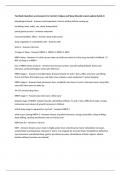Test Bank Questions and Answers for Comfort, fatigue and Sleep Disorder Latest update Rated A+
physiological needs - Answers most important, have to achieve before moving up
breathing, food, water, sex, sleep, homeostasis
pineal gland secretes - Answers melatonin
neurotransmitters affect - Answers sleep wake cycles
sleep regulation is controlled by the - Answers CNS
brain is - Answers the boss
4 stages of sleep - Answers NREM-1, NREM-2, NREM-3, REM
NREM sleep - Answers it is vital! occurs when ras (tells you when it is time to go to bed) is inhibited, 75-
80% of sleep is in NREM
loss of NREM sleep results in - Answers low immune system, wound healing delayed, lower pain
tolerance, profound fatigue, lower pain tolerance
NREM stage 1 - Answers very light sleep, drowsy/relaxed, hr and rr slow a little, may hear something
that is not there that wakes you, only lasts a few minutes, easily awakened "I wasnt sleeping"
NREM stage 2 - Answers body processes slow, metabolic rate slows, hr and rr decrease more, temp falls,
eyes still, takes more to wake up
44-55% of total sleep here
NREM stage 3 - Answers aka slow wave, delta wave
deepest stage of NREM, relaxed muscles, diminished reflexes, hr and rr slow, difficult to wake, energy
restoration and release of growth hormone in children
which sleep stage is required for survival? - Answers NREM 3
what occurs during NREM 3 - Answers release of growth hormone, energy restoration, sleep walking,
sleep talking, snoring and dreams (not as vivid as rem)
REM lasts for - Answers 5-30 min
REM - Answers dreams occur, brain is highly active (very vivid dreams), brain metabolism increases,
acetylcholine and dopamine released, hr and rr are irregular (bc increase brain metabolism), distinctive
eye movement, paradoxial sleep, gastric secretions increase, stimulations of brain regions, absent
tendon reflexes (muscles are relaxed)
, why is it good that muscles are not working properly during REM stage? - Answers b/c such vivid dreams
you could potentially hurt your bed partner
once you wake up during the sleep cycle - Answers it starts over
one full sleep cycle for adults is - Answers 90-110 min, 4-6 cycles during a nights sleep
as the sleep cycle progresses more time is spent in - Answers REM
functions of sleep - Answers restores activity levels, normal balance and parts of the nervous system,
needed for protein synthesis and psychological well-being
cannot process short term memory if - Answers we don't sleep
ex) no point in studying all night and not sleeping bc you will not remember what you studied
neonates need how much sleep? - Answers 12-18 hr
enter rem sleep immediately (startled awake, hr and rr irregular=normal for rem)
infants need how much sleep? - Answers 8-10 hr
1/2 of sleep in light sleep,
after 6 mo we should see infants sleeping - Answers longer at night
by 12 mo of age should be sleeping for - Answers 9-12 hours
toddlers (1-3) should sleep for - Answers 12-14 hours
need 1 nap
characteristics of toddlers sleeping - Answers resists bedtime, security object (blanket, stuffed animal),
day time attention affected, strict sleep schedule, have a consistent bedtime
night terrors begin to occur at what age? - Answers school aged children
preschool aged children (3-5) should be sleeping for - Answers 11-13 hours a night
characteristics of preschool aged children and sleeping - Answers procrastinates at bedtime (one more
book?), wake up frequently naturally, afraid of the dark (have scary dreams), lack of sleep=irritable,
consistency and sleep hygiene (good sleep routine)
school aged children (6-11) should be sleeping for - Answers 9-12 hr a night
school aged children characteristics of sleeping - Answers need encouragement sometimes, they want
independence to do sleep routine, no naps are needed (dont offer them)
adolescents (12-18) need how much sleep? - Answers 8-10 hr a night




